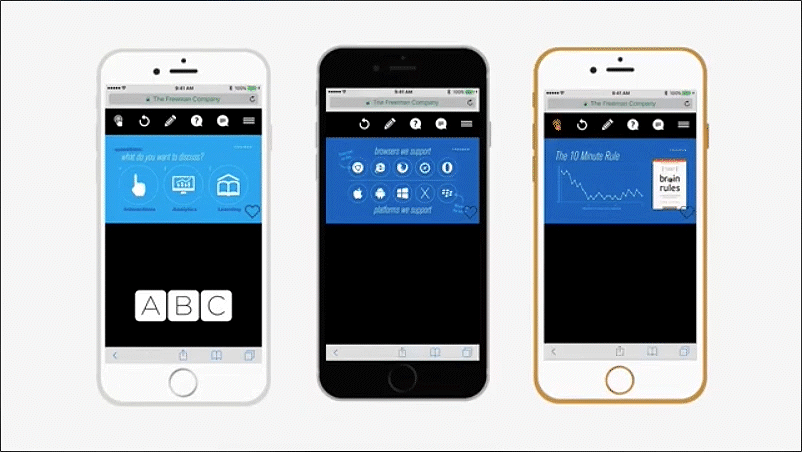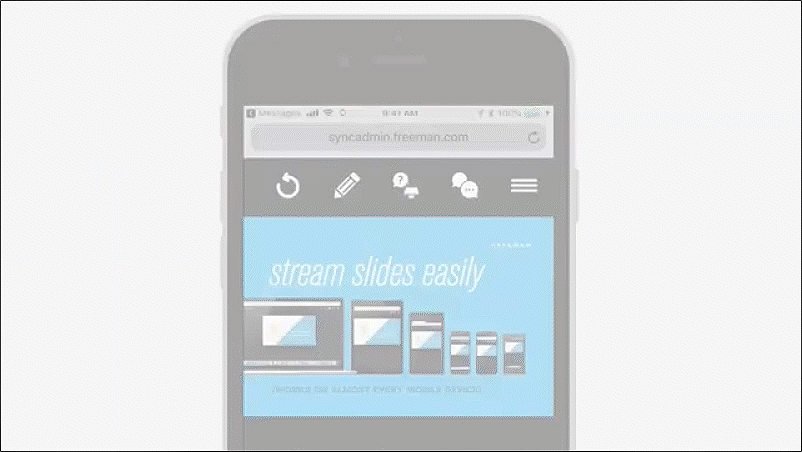Freeman
Enhancing Live Audience Participation
Improved live audience engagement at conferences and trade events with mobile participation features and conference tools for participants, AV techs, & moderators.
Contribution
Built and launched a mobile & desktop app that reached 40,000 live attendees.
Improved attendee & presenter conference experience.
Established an in-field UX testing practice
Tools
Adobe XD
Webflow
Duration
12 months
Launched 2018
Introduction
Second Screen Engagement Platform
Enables seamless two-way dynamic participation, allowing presenters and audiences to interact, fostering impactful real-time conversations during presentations.
Personalize
Chat
Ask questions
Take notes
Follow a presentation
Audience members can use their mobile devices to follow along a live presentation.
Sync Introduction
Personas
Three key users
Audience
Mobile users
Participate in polling and ask questions
Watch the presentation and take notes
Moderator
Desktop
Moderates audience streams
Works with presenter to address questions
AV Tech
All devices
Run the behind the scenes tech
Operate presentation software & AV tech
Usage
Typical usage at mid-to-large conferences
What I worked on :
Audience Participation Tools
Live Audience Voting
We presented familiar voting patterns (multiple choice, thumbs up) as large touch points to get users attention and inspire their interaction.
Various polling options mobile interaction.
Audience Participation Tools
Live Audience Question Stream
A side drawer opens on demand by users when they are ready to submit and vote on questions to presenters.
Question stream mobile drawer interaction.
Tech Control Center
Desktop Control Center for AV Techs
Key design features:
Dark mode for comfort in dark conference rooms
Incorporated familiar design patterns identified in other AV/Tech software to minimize learning curve
UX Testing
Freeman’s First Ever In-Field Study & UX Testing
Leading up to the conference, I was able to convince the leadership team and the client to do usability and experience testing. At the conference, I was able to conduct UX tests, interview attendees, and do in-field observations of how the new features are used. Here are the top three pain points that I observed.
Top three pain points
Editing submitted questions lacks feedback
Activity when filters are ON makes moderators nervous that they may miss something
Moderators are overwhelmed by the Presenter Control panel on desktop
ASCO conference 2018, photo taken by me.
Iterative Changes after UX Testing
Simplified moderation with mobile controls
Key design features:
Dark mode for users’ eye comfort - and less disturbance to fellow attendees.
Bottom aligned buttons and menus for thumb comfort.
Controls like hide and block to empower moderators.
Simpler controls than full desktop dashboard focused on the main task of moderation.
Iterative Changes after UX Testing
Brought forward unseen question count
Moderators would miss questions when filters were turned on. Adding a link that clears the filters with a live question count allows for moderators to see incoming information they would otherwise miss.
Iterative Changes after UX Testing
Displayed system feedback when editing
Originally, editing a submitted question was hidden and the controls unknown. By adding controls and feedback to the design, the users are able to know the state that their edits are in.
Final Takeaways
The in-the-wild testing was great but we needed to conduct them more regularly. At least prior to any major new feature release.
The tech admin feedback is critical. Often their gripes with the product are overshadowed by the Clients needs. We need to develop a standardized way of collecting on-show-site feedback about THEIR experiences. They are the ones who engage with the product the most.
Need to train on-show-site staff to conduct interviews with presenters and attendees in order to gather more data about the product.












